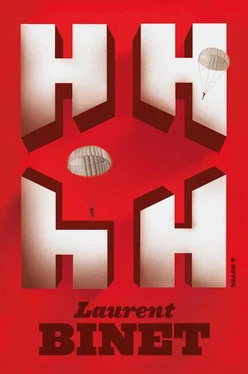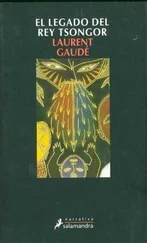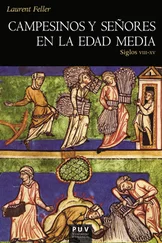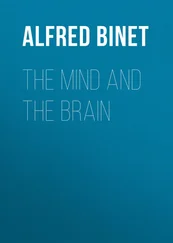Returning to Prague, the parachutists are very annoyed. They’ve been forced to risk compromising their principal mission—their historic mission—and for what? Nothing but a few big guns. They send London a sharp message suggesting that next time they send pilots with some knowledge of the region.
To tell the truth, I can’t even be sure that Gabčík was present for this mission in Pilsen. All I know is that Kubiš, Valčík, and Čurda were.
I’ve just realized that apart from one elliptic allusion in Chapter 178, I haven’t mentioned Karel Čurda before now. And yet, historically and dramatically, he is going to play an essential role in this story.
All good stories need a traitor. The one in mine is called Karel Čurda. He’s thirty years old, and I can’t tell, judging from the photos I’ve seen, whether his betrayal can be read upon his face. He is a Czech parachutist whose background is so similar that it could be mistaken for those of Gabčík, Kubiš, or Valčík. Demobilized from the army after the German occupation, he leaves the country via Poland and travels to France, where he enlists in the Foreign Legion. He joins the Czechoslovak army-in-exile and, after the defeat of France, crosses to England. Unlike Gabčík, Kubiš, and Valčík, he is not sent to the front during the French retreat—but this is not what makes him fundamentally different to the other parachutists. In England, he volunteers for special missions and follows the same intensive training. He is parachuted over the Protectorate with two other comrades on the night of March 27–28. As for what follows… well, it’s still too early to tell you that.
But it’s in England that the seeds of the drama are sown, because it’s here that it might have been avoided. Here, Karel Čurda’s dubious character gradually reveals itself. He is a heavy drinker. Not a crime, obviously, but when he drinks too much he says things that alarm his regimental comrades. He says he admires Hitler. He says he regrets having left the Protectorate; that he would have a better life if he’d stayed there. His comrades consider him so unreliable that they write to General Ingr, the minister of defense in the Czech government-in-exile, warning him about Čurda. They add that he has also attempted to con two English girls who were in love with him. Heydrich, in his day, was kicked out of the navy for less than that. The minister passes on this information to Colonel Moravec, who is in charge of special operations. And this is precisely where the fate of many men is sealed. What does Moravec do? Nothing. He just notes in the files that Čurda is a good sportsman with impressive physical capacities. He does not remove him from the list of parachutists chosen for special missions. And on the night of March 27–28, Čurda is dropped over Moravia with two other comrades. Helped by the local Resistance, he manages to reach Prague.
After the war, someone will note that almost all of the dozens of parachutists chosen to be sent on special missions in the Protectorate gave patriotism as their motive for volunteering. Only two—one of them Čurda—said they volunteered because they were seeking adventure, and both turned out to be traitors.
But in terms of its impact, the betrayal committed by the other man will bear no comparison at all with that of Karel Čurda.
The train station in Prague is a magnificent dark stone building with two perfectly disturbing towers. Today is the Führer’s birthday—April 20, 1942—and President Hácha is going to present him with a gift from the Czech people: a medical train. The ceremony is taking place in the station, naturally enough, with the highlight being a personal inspection of the train by the Protector himself. While Heydrich boards the train, a crowd of gawkers gathers outside. They stand in the vicinity of a white sign planted in the ground, declaring: “Here stood the memorial of Wilson, removed on the orders of Reich-Protector SS-Obergruppenführer Heydrich.” I would like to be able to tell you that Gabčík and Kubiš are in that crowd, but I have no idea if it’s true—and I suspect it isn’t. To see Heydrich in these circumstances is of no practical use to them as it’s a one-off event, unlikely to reoccur. And with the station so heavily guarded, being here would expose them to pointless risk.
On the other hand, I’m almost certain that the joke which is immediately spread around town has its origin here. I imagine someone in the crowd—probably an old man, a guardian of the Czech spirit—saying in a loud voice, so that everyone around him can hear: “Poor Hitler! He must be really ill if he needs a whole train to make him better…” That’s straight out of the good soldier Švejk.
Lying on his little iron bed, Jozef Gabčík listens to the sound of the tramway bell outside as the tram approaches Karlovo náměstí—Charles Square. Very close to here is Resslova Street, which leads down to the river: the street still knows nothing of the tragedy whose setting it will soon provide. A few shafts of sunlight force their way through the closed shutters of the apartment where, these days, Gabčík lives in hiding. From time to time you can hear the floorboards creak in the corridor, or on the landing, or in a neighbor’s apartment. Gabčík is alert but calm, as always. His eyes stare at the ceiling while in his mind he draws maps of Europe. In one map, Czechoslovakia has its old borders back. In another, the brown plague has spread across the Channel, attaching Great Britain to one of the swastika’s arms. But Gabčík, like Kubiš, tells anyone who’ll listen that the war will be over in less than a year—and he probably believes it too. And not over in the way the Germans want it to be, obviously. Their first fatal error was declaring war on the USSR. Their second was declaring war on the United States in order to honor their alliance with Japan. It’s quite ironic that, if France was defeated in 1940 because she didn’t honor her promises to Czechoslovakia in 1938, Germany should now be about to lose the war because she did honor hers to Japan. But one year! In retrospect, this is touchingly optimistic.
I’m sure these political musings occupy Gabčík’s mind, and the minds of his friends; I’m sure they have endless discussions at night, when they can’t sleep, when they’re able to relax a little by chatting. As long as they can forget the possibility of a nocturnal visit from the Gestapo. As long as they can stop themselves jumping at the slightest noise in the street, on the staircase, in the house. As long as they don’t hear imaginary bells ringing in their heads, and yet are still able to listen out for the sound of real bells ringing.
This is another age—one where, each day, people eagerly look forward not to sports results but to news from the Russian front.
The Russian front, however, is not uppermost in Gabčík’s mind. The single most important thing in the war today is his mission. How many people believe this? Gabčík and Kubiš are convinced. Valčík too. And Colonel Moravec. And President Beneš, for the moment. And me. That’s all, I think. In any case, only a handful of men know about Operation Anthropoid’s objective. But even among this handful, there are some who disapprove.
This is true of certain parachutists working in Prague, and also of certain Resistance leaders—because they fear the reprisals that will be unleashed if the operation succeeds. Gabčík had a tedious argument with them the other day. They wanted to persuade him to give up his mission, or at least to change his target—to choose a prominent Czech collaborator, Emanuel Moravec, for instance, instead of Heydrich. This fear of the German! It’s like a man who beats his dog: the dog may sometimes refuse to obey his master, but he will never turn on him.
Читать дальше












